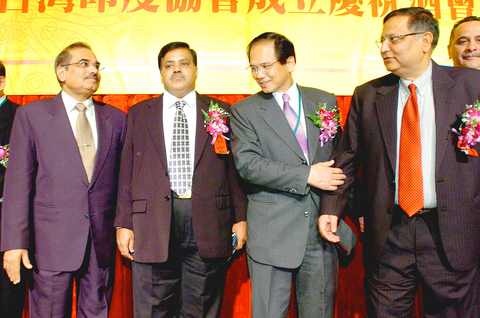The Taiwan-India Cooperation Council (TICC), a private organization with participation from businesses, the government and academics, was established yesterday in Taipei, with Democratic Progressive Party (DPP) Chair-man Yu Shyi-kun elected as its first chairman.
The council aims to act as a bridge to promote economic exchanges and broader cooperation on bilateral interests between Taiwan and India.
Yu said that the council's founding grows out of the government's "Go South" policy, which was proposed during Yu's tenure as premier.

PHOTO: SEAN CHAO, TAIPEI TIMES
The policy emphasizes India as an ideal investment destination for Taiwanese businesses and as a way to decrease their reliance on the China market alone.
"India is seen as having the best potential among the four golden `BRIC' [Brazil, Russia, India and China] countries. Besides, Taiwan and India's collaboration in software and hardware and India's overall economic takeoff will provide even more opportunities for Taiwan-India economic and trade cooperation," Yu said.
Yu said the idea to promote closer Taiwan-India exchanges is in line with the Indian government's "Look East policy," which overlaps with Taiwan's "Go South Policy."
Brigadier Arun Sahgal, the deputy director of India's United Service Institution, who formerly served in India's defense department, attended the council's founding ceremony yesterday. He said the council provides a channel for India to reach out to East Asia, a policy the Indian government has been working toward in recent years.
"India's `Look East Policy' engages mostly with Southeast Asia, but India is looking for much greater engagement with East Asia. It is in this context that our relationship with Taiwan is extremely important. We would like to use our new-found confidence and new-found economic development model to engage to a much greater degree with Taiwan," Sahgal said.
Commenting on the possibility of extending cooperation beyond economic matters, Sahgal said "as our economic interests in Taiwan increase, we'll be [more] interested and involved in the security and stability of the region."
Sahgal added that India would certainly pursue more strategic dialogue with Taiwan as its exchanges increase.
"Once we have the trade, we'll develop our interests in the security and safety of Taiwan to protect our own trade," he said.
Dilip Amarnani, a businessman and director of Taipei's Indian Overseas Compatriot Association, said yesterday that an important business opportunity that India offers, in contrast to China, is its strong middle-class market comprising 300 million citizens -- a convincing point for Taiwanese businesspeople, who wouldn't have to seek other export markets as much as they have to do with their operations in China.
"When the Taiwanese go to China, they are going to produce goods to export. You are not sure whether you'll find a market there. But in India, you already have a market within India itself. You don't have to look around for other markets," Amarnani said.
The amount of Taiwan-India bilateral trade reached US$1.93 billion in 2004, which is five times more than the 1990 bilateral trade figures.
The bilateral cooperation projects are mainly in the high-tech sector. There are now more than 1,000 Indian engineers in Taiwan.

‘DENIAL DEFENSE’: The US would increase its military presence with uncrewed ships, and submarines, while boosting defense in the Indo-Pacific, a Pete Hegseth memo said The US is reorienting its military strategy to focus primarily on deterring a potential Chinese invasion of Taiwan, a memo signed by US Secretary of Defense Pete Hegseth showed. The memo also called on Taiwan to increase its defense spending. The document, known as the “Interim National Defense Strategic Guidance,” was distributed this month and detailed the national defense plans of US President Donald Trump’s administration, an article in the Washington Post said on Saturday. It outlines how the US can prepare for a potential war with China and defend itself from threats in the “near abroad,” including Greenland and the Panama

A wild live dugong was found in Taiwan for the first time in 88 years, after it was accidentally caught by a fisher’s net on Tuesday in Yilan County’s Fenniaolin (粉鳥林). This is the first sighting of the species in Taiwan since 1937, having already been considered “extinct” in the country and considered as “vulnerable” by the International Union for Conservation of Nature. A fisher surnamed Chen (陳) went to Fenniaolin to collect the fish in his netting, but instead caught a 3m long, 500kg dugong. The fisher released the animal back into the wild, not realizing it was an endangered species at

The High Prosecutors’ Office yesterday withdrew an appeal against the acquittal of a former bank manager 22 years after his death, marking Taiwan’s first instance of prosecutors rendering posthumous justice to a wrongfully convicted defendant. Chu Ching-en (諸慶恩) — formerly a manager at the Taipei branch of BNP Paribas — was in 1999 accused by Weng Mao-chung (翁茂鍾), then-president of Chia Her Industrial Co, of forging a request for a fixed deposit of US$10 million by I-Hwa Industrial Co, a subsidiary of Chia Her, which was used as collateral. Chu was ruled not guilty in the first trial, but was found guilty

DEADLOCK: As the commission is unable to forum a quorum to review license renewal applications, the channel operators are not at fault and can air past their license date The National Communications Commission (NCC) yesterday said that the Public Television Service (PTS) and 36 other television and radio broadcasters could continue airing, despite the commission’s inability to meet a quorum to review their license renewal applications. The licenses of PTS and the other channels are set to expire between this month and June. The National Communications Commission Organization Act (國家通訊傳播委員會組織法) stipulates that the commission must meet the mandated quorum of four to hold a valid meeting. The seven-member commission currently has only three commissioners. “We have informed the channel operators of the progress we have made in reviewing their license renewal applications, and